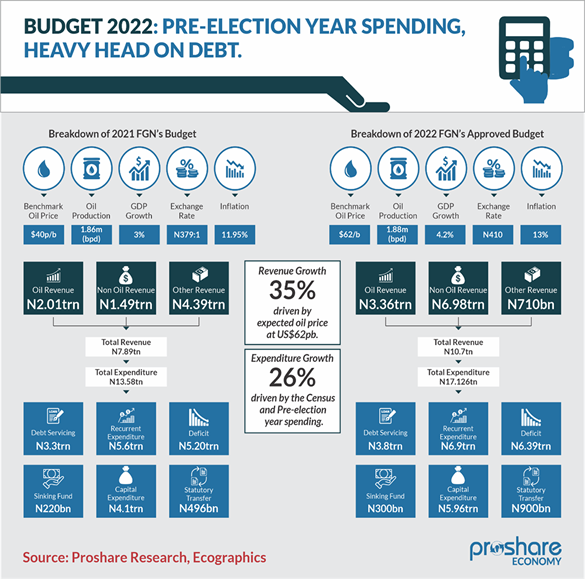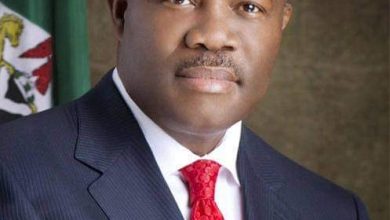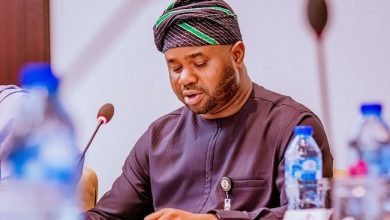Need to Rethink, Reimagine and Restrategise the Federal Government Budget – A Governance Insight

Being remarks by Dr Ije JIDENMA, FIoD; the President/ Chairman in Council of the Institute of Directors (IoD) Nigeria, represented by Olufemi Awoyemi, FIoD at the LCCI’s 2022 Federal Budget Analysis Session at Commerce House, Victoria Island, Lagos, Nigeria on Tuesday, 18 January, 2022.
Introduction
With the 2022 budget, like all plans; the crucial trigger is not the ‘look and feel’ but the purpose and principles underlying its execution to achieve desired objectives. In essence, the 2022 Federal Government Budget is as good as the governance structure that drives its goals (execution) towards achieving its purpose.
If the 2022 budget is to go beyond the extremely modest achievements of its earlier siblings, then the governance architecture around the budget must be the key item we review, and where gaps are observed, it’s execution must be rethought, reimagined and restrategized.
With the 2022 budget being the last full budget of the President Muhammadu Buhari administration it must bark and bite. The budget must leave a legacy upon which a new government can build.
The primary focus for the IoD, therefore, is not necessarily the nuts and bolts of the numbers (there are experts to do that) but the governance structure (our expertise) around the budget; viz:
- Does the budget rethink governance,
- Does the budget adopt a whole of government approach ie One- Government;
- Does the budget reimagine the purpose of statecraft,
- Does the budget establish accountability in public finance; and
- Does the budget introduce freshness in strategy?
It is on this premise that I offer the following contributions.
Asking the Right Questions
The more we look at the 2022 budget, the more it becomes clear that the right questions need to be asked and answered; to build on the improvements we have seen in the compliance with budget cycle, refocusing budget items and shifts in monitoring.
The allocations in the budget were guided by a Zero-Based Budgeting (ZBB) principle and the National Development Plan (NDP) 2021 – 2025. While the ZBB demands that all expenses must be justified for each new period, the budgetary consideration for the current NDP implies that the 2022 budget was built to align with national development priorities.
Nevertheless, an important consideration is that the process that governs the budget implementation is as important as the budget itself. Knowing that insecurity, revenue challenges, and planning implementation issues are the major limitation to the budgetary process, and by extension the economic growth and sustainability of Nigeria; these issue must take precedence in the 2022 budget review.
The questions we are looking at are around the implementation framework of the budget.
- Will the policies and programmes highlighted in the budget address the current security challenges?
- Are the capital projects self-financing to resolve our current revenue challenges as identified by the Honourable Minister of Budget, Finance, and National Planning, Zainab Ahmed, during the budget presentation?
- Are there structures for the public and private sectors to govern the implementation of the budget?
My point essentially therefore, is that we cannot have a thriving economy without a thriving society and by extension, economic activities cannot thrive without fit-for-purpose governance; of which the resolution of security concerns is vital.
In the same vein, funding budget gaps through debt comes with governance risks, chief of which is that future generations may become victims of a debt crisis if we do not invest in self-sustaining projects or adopt creative ways of curtailing and reversing the growing debt.
More importantly, we need to have clarity on the right policies, programmes, processes, people, and structures that could support the actualization of the budget. These are the issues I believe should form the basis of our 2022 budget analysis contributions.
Having said that, let me look at the other issues in the recent budget, as adapted from Proshare’s 2021 Year-End Review and 2022 Outlook.
A Quick Review of the 2021 Approved Budget
The 2021 “Budget of Economic Recovery and Resilience” as passed by the Nigerian Senate in December 2020 had an aggregate expenditure of N13.59tn with retained revenue of N7.99tn and a projected fiscal deficit of N5.6tn.

A look at the half-year Implementation report for the 2021 budget shows that as of May 2021, the Federal government’s retained revenue underperformed at 67%. On the other hand, total expenditure performed much better at 92.7% of project expenditure.
Essentially, the first half of 2021 saw budget implementation suffer from revenue shocks when oil prices traded lower. However, by the end of August, the performance of revenue improved to 73% of prorated revenue, following a steady rise in crude oil prices.
A breakdown of the expenditure showed that while N1.79tn had been expended on capital projects, and N2.57tn for personnel cost, N2.87tn was utilized for debt service. The debt service to revenue ratio improved from 98% in May to 76% in November as oil prices rallied breaching the $80/barrel mark.
Overall, the 2021 budget implementation is looking to fall short of projection even as the government extended the implementation of the 2021 budget to March 2022. The under-implementation is predicated on the knock-on effect from the 2020 budget implementation in which period MDAs received allocations for Capital projects but could not implement them due to the global restrictions in 2020 and the insecurity situation in the country.
Budget Parameters and Fiscal Assumptions
The assumption of the 2022 budget of ‘Economic Growth and Sustainability’ is rather too optimistic as most of the assumptions of 2020 and 2021 budgets did not materialize (See Table 1 below).
Table 1: Comparison of budgets assumptions in Nigeria 2020-2022
| 2020 Projected | 2021 projected | 2021 actual 11months | 2022 Projected | |
| Crude oil price ($ per barrel) | 57 | 40 | 7o.96 | 62 |
| Crude oil production (mb/d) | 2.18 | 1.86 | 1.6 | 1.88 |
| Exchange rate ( | 305 | 379 | 409.66 | 410.15 |
| GDP growth rate | 293% | 3% | 3.18 | 4.2% |
| Inflation rate | 10.8% | 11.95% | 17.11 | 13% |
The increase in crude oil prices in 2021 which should ordinarily profit the proposed budget was eroded by the subsidy regime.
Similarly, several variables will undermine the performance of the 2022 budget assumptions. The key variables are the emergence and spread of different variants of Covid-19 as well as the government response to the spread; movement in interest rates across the globe; movement in the naira exchange rate; fuel subsidy regime; further hike in electricity tariff; maturity of government loans; Basel III implementation by banks, and continuous force majeure at oil terminals and pipeline networks across the country.
Particularly, the expected rate hike across the globe is expected to lead to an increase in the cost of borrowing by the government, increase in capital outflow, and depreciation of the naira against the hard currencies. The implication is that the government need to refocus its attention on financing its projects through the Nigeria capital market.
Key Elements of the Expenditure
The 2022 budget provided for an estimated aggregate expenditure of N17.13tn, an increase of N735.85bn over the earlier proposed N16.39tn and a 17.57% increase over the N14.57tn proposed for 2021 (See Table 2 below). The increase in the proposed expenditure is attributed to the reduction of 10,733 projects in favour of additional 6,576 new projects by the lawmakers which Mr President had expressed concerns about.
Table 2: 2022 Budget Expenditure Highlights
| Expenditure head | Value | % of total expenditure |
| Recurrent expenditure | 6.91tn | 40.3% |
| Capital expenditure | 5.96tn | 31.9% |
| Debt servicing | 3.61tn | 22.1% |
| Statutory transfer | 869.67bn | 5.1% |
| Sinking fund | 270.71bn | 1.6% |
| Total Expenditure | 17.13tn | 100% |
Nigeria has continuously grown its expenditure in nominal terms, yet given the country’s GDP and stage of development, Analysts believe that the size of the budget should be larger to improve the growth prospects of the economy.
Notably, President Muhammadu Buhari has expressed strong reservations on the “worrisome changes” made by the National Assembly to the 2022 Executive Budget proposal.
Here are my concerns about the proposed expenditure:
- The President assented to a revised 2022 budget that has not been verified based on the Zero-Based Budgeting principle. This call to question the underlining principle of the entire budget.
- The budgeted expenditure for2021 had a near-optimal performance based on the prorated review by the Minister of Finance. However, economic indicators came out unfavourable in 2021 with a general price increase, heightened insecurity, and high unemployment rates. How is the 2022 budget implementation going to be different?
- What are the effective, efficient, and productive structures in place for its implementation?
- Have we identified our area of competitive advantage as a nation and what priority are we giving to those areas? How much investment do we intend to commit to human capital development, entertainment, R&D, among others?
- How do we intend to drive the productivity and competitiveness of Nigeria with the 2022 budget under the broad scope of the AfCFTA agreement?
- Can we drive the actualization of the 2022 budget with a PPP model given the efficiency and effectiveness of the private sector in economic productivity?
- Have we structured the 2022 projects to be self-financing? If not, can we leverage other means of managing the debt servicing costs to save us from the eventual debt cost trap.
- The rollout of the i-monitor and Citizens’ Budget Monitoring app is a welcome development for accountability but do the private sector have a choice in the selection of those projects? Are there structures in place to govern faithfully the feedback from the people?
Key Revenue Heads
The estimated aggregate revenue to fund the 2022 budget is N10.7tn which is 32% higher than the 2021 estimate of N8.1tn. In aggregate, 35% of projected revenues is projected to come from oil-related sources and 65% from non-oil sources.
My main concern in the revenue projection is that the budget assumptions may be overly optimistic and underperform in 2022 on the back of oil production constraints and expected hike in interest rates across the globe which would discourage foreign loans. This leaves the government with the option of domestic borrowing which could crowd out the private sector from the fixed income market.
Deficit Financing
The fact that government revenue sources have in recent times been badly affected by the drop in global crude oil prices and the fact that revenue diversification only materializes in the long term implies that deficit financing is inevitable in the budget of an ambitious government.
Nigeria’s growth trajectory requires bold spending plans which cannot do without some form of borrowing. The reality is that debt would continue to rise but this does not have to imply higher debt costs. Interest payments can be kept minimal if the government selects more efficient debt options, the most preferred being interest-free commercial bonds.
By choosing to issue non- interest-paying bonds the DMO can help the country avoid an unwarranted depletion of already declining revenue. The potentials for issuing non-interest debt are available locally and globally, while other countries are taking advantage of the opportunities, Nigeria continues to be the laggard thereby piling up huge debt service obligations which are significantly denominated in foreign currencies, a situation that could worsen the situation.
Some commentators, however, are of the view that we should overlook deficit financing in favour of productivity drive as the focus of the entire budget. They argue: when we are productive, we will naturally generate sufficient revenue to finance our estimated expenditure. I believe this is already receiving the attention of the Budget Office of the Federation.
Implication for Sub-nationals
The combined spending of N26.59tn was planned for 2022 at both the Federal and State levels. Of this amount, the Federal Government plans to expend N17.13tn which is equivalent to 64.4% of the combined budget. When compared to the 2021 budget where the FG’s proportion was slightly lower at 62.43%, we find that once again the FG is dominating the fiscal space contrary to the principle of Fiscal Subsidiarity. The idea of Fiscal Subsidiarity suggests that sustainable growth and development is more easily attained under a system where the federating units closest to the citizenry are accorded more of the Fiscal powers and responsibilities.
A closer look at the data also shows that the Budget of south-western states is the highest with planned spending of N2.55tn in 2022. Of this amount Lagos State alone accounts for N1.76tn, this is understandable being the commercial nerve centre of the country. The South-South Region comes in second with a budget of N2.35tn, N200bn less than that of the South-West. This also represents a 4.3% increase in the region’s spending plans. The North-Central states have a combined budget that amounts to N923bn, this is not just the lowest of all the 6 geo-political zones but lower than the budget of Lagos State alone. Capital expenditure in the region is capped at a little over N370bn while recurrent expenditure would be double the amount. This unambitious and misaligned spending plan further points to the need to focus more attention on the Fiscal operation of the Sub-Nationals.
Essentially, the disparity in budgetary expenditures of the sub-nationals underscores the need to drive the productivity and competitiveness of the different regions/states through a truly federal structure.
Conclusion
Nigeria has been involved in several National Development Plans to align government programmes with national outcomes. The main policy and legislative instrument for translating such development plans into annual programmes happen to be the annual budget.
Nigeria’s annual national budget has been quite robust on paper, but the main problem has always been how to translate the budget into working projects and deliberate outcomes. Annually, we fall short of the people, policies, processes, and structures to govern the translation of the budget to concrete outcomes. This is the real loophole in the annual budget which is set to confront this 2022 budget.
It is not enough for the budget to provide for the roles of public, private, and multilateral finance organisations in its funding. A deliberate attempt must be made to rethink, reimagine, and restrategise the budget to support the input of the public and private sector in governance the implementation. It is never too late to call the private sector to a round table discussion to strategise the best possible model to implement the provisions of the 2022 budget.
Collaboration between the public and private sector wherein the private sector brings its drive for productivity and competitiveness while the public sector brings its social impact objectives would help to translate the overall strategy and programmes implemented in the 2022 budget into concrete outcomes.
If we do not adopt the three Rs of Rethinking, Reimagining, and Restrategising the 2022 budget, then we should not expect a different outcome from 2021. We can however take this on-board in the 2023 Budget of ‘Hard Choices’






